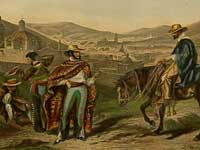Manifest Destiny
 Rancheros by Pedro Lehnert
Rancheros by Pedro LehnertDeGolyer Library, Southern Methodist University
An Early Agenda of Expansion
A Conversation With Josefina Zoraida Vázquez
El Colegio de México
To understand the significance that the history of the war against the United States had for Mexico, we must remember the significance this history has for these two countries. I believe we have to start by looking at the meaning history has in both countries. [By the mid-19th century, Mexicans had been living in Mexico for more than a century. And so, history is part of them. While in the United States, most of its population usually could be traced back one or two generations, and so the history of war is a thing of the past, something foreign to them, when their forefathers were somewhere else. Therefore, neither the war nor history has the same meaning for either country.
Generally, when we read about Mexico's history during the period preceding the war, it seems as if it was nothing but turmoil and coups d'état. In reality, it is the product of the social and political fragmentation resulting from different events: the reforms of the Spanish Empire, the war for independence, followed by intents to reorganize Mexico in the midst of bankruptcy and foreign threat.
In truth, many problems faced this huge territory, which had all the possible resources—all of Texas', California's and the rest of Mexico's actual territory. But the biggest problem was its population. It was scarcely populated with its northern part practically uninhabitable, and then very concentrated in the middle and southern parts. This was a problem. To this problem was the added fact that the mountainous land made it difficult to establish communications, so that in addition to being uninhabited, it was practically isolated. The foundation of the country with such immense territory was very weak.
The United States had always added territory. For them, the conquest of the west was a natural thing, even at the cost of taking land belonging to another country.
Since the time when the 13 Colonies were established, they had set their eyes on the northern territory of New Spain. Why? Well, because it was so uninhabited and it seemed to be inviting them to take it. And so from the beginning, taking Texas became one of its goals.
 Chihuaha by Pedro Lehnert
Chihuaha by Pedro LehnertDeGolyer Library, Southern Methodist University
I think that this expansionism was very obvious by the late 1830s and most of all by the early '40s. In the early '40s, countless books appeared on the subject of California emphasizing its richness, its mild climate, its beautiful and marvelous ports, which could be used in this Utopia that the United States had always had about trading with China. And so, the objective was very clear: California would be very present on the agenda in Washington.
This was clear from the moment Polk—a determined expansionist without any reservations—was elected. He was certain that he would do anything to reach his goals, and California was a priority for him.
Without a doubt, Polk's election to the presidency practically meant that there would be no other solution but the war, which Mexico tried to avoid because it did not have the resources to meet it head on.






